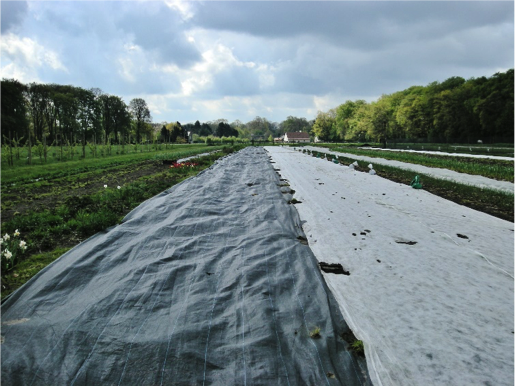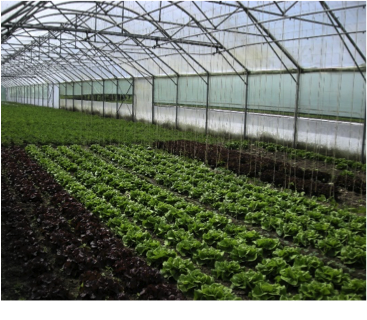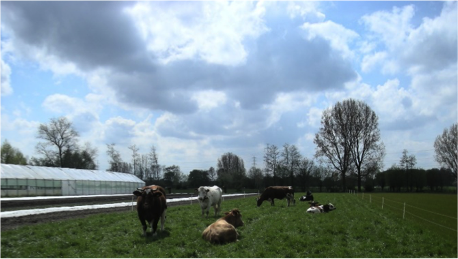Know your farmer, know your food!
Some of us might still think our food just comes from supermarkets, but of course the reality is that there is a great deal of hard work behind the vegetables, fruit, bread, honey, meat, fish, and cheese we eat every day, which we might not realise. Farmers and producers can face difficulties with unstable incomes and a reduction in farmland. There is also the added question of who will produce our food, as most of the global population now lives in urban areas.1
In a trip organised by PAN (Pesticide Action Network) Europe visited two local farms in Flanders on Thursday 28th April to get in touch with some producers of the food I eat, it was also a good opportunity to connect with nature, and being outside is good for one’s physical and mental health.2
Wijveld, Destelbergen

Wijveld is one of the many farms in Belgium that operate a Community Supported Agriculture scheme (CSA). CSAs can be seen as a partnership between a farm and a community of supporters. By purchasing a share of the organic, seasonal, and fresh produce, these supporters can cover the farm’s yearly operating budget .
Wijveldtake takes great care to ensure that the environment is not negatively affected by the agricultural activities on their 1.7-hectare plot. They take care of the soil, rotate crops, and do whatever they can to increase fertility. They have studied their soil quality to determine its acidity, and found that it is not suitable for growing certain crops such as: cauliflowers, broccoli, or pulses. Nonetheless, they still have plenty of other crops, including: onions, carrots, peas, potatoes, cabbages, tomatoes (during the summer), beans, spinach, chard, apples, blueberries, and strawberries. They are very dependent on the weather, as they cannot install any plastics or greenhouses, this means they mostly work with seasonal produce. They also have organic certification which can be problematic when preventing pests and (unexpected) animal visits. To combat this, they have recently started using coffee and flowers in attempts to protect their crops.
De Zonnekouter, Machelen

De Zonnekouter is a cooperative run by young farmers that offers the opportunity to establish short chain organic farming cooperation with other entities, helping them achieve their vision of biodiversity, an ecological-friendly footprint, and smart crop choices. As a family business with 15 years’ experience of organic farming, they have been able to adapt their production to costumer demand and, for that reason, like Wijveld, they create far less food waste when compared to distributing their products to supermarkets under specific standards. Their produce is sold directly to the organisation Vroente, which makes the link between them and their consumers, using sustainable transportation for its supply. By working alongside another nearby cooperative, De Zonnekouter is able to coordinate on which crops to cultivate at different times – for example whilst one cooperative cultivates carrots, the other will grow beetroots.

Growing vegetables and fruits both
outside and inside the greenhouse, De Zonnekouter is a mixed farm that also raises livestock such as: cows, sheep, chickens, and pigs. They also have an apiary for bees.
One might think that this farm (with a total of 6 hectares) takes up a lot of the farmers time, but with the help of some machine tools, (both manual and automatic), they only work 5 days per week.
They are working hard to recover certain species of vegetables that are no longer grown in the area, but seeing their motivation and willingness to improve, they make the difficult job of farming appear effortless.
Looking at these community supported agricultural schemes in action shows that there is great potential for the healthcare sector to follow these examples in sourcing local and organic food, without incurring huge additional expense.
At HCWH Europe, we propose that hospitals and other healthcare facilities:
- Use existing directories or databases to identify and support potential local suppliers
- Invest time in making contacts, arranging visits to farms and factories where possible and appropriate, and organising ‘meet the buyer’ events
In order to source a greater volume and variety of fresh and high-quality produce, hospitals and healthcare facilities should consider splitting some supply contracts into lots by geographical or commodity units - creating more opportunities for smaller local and, if possible, organic suppliers.
Because what is more important than buying local and organic? Know your farmer and know your food, and make the world a little bit more green.
- Paola Hernández, Sustainable and Healthy Food Programme Intern

All images by Paola Hernández
(1) World's population increasingly urban with more than half living in urban areas http://www.un.org/en/development/desa/news/population/world-urbanization-prospects-2014.html
(2) Coles, J. (2016) How nature is good for our health and happiness. BBC News. http://www.bbc.com/earth/story/20160420-how-nature-is-good-for-our-health-and-happiness?ocid=fbert
